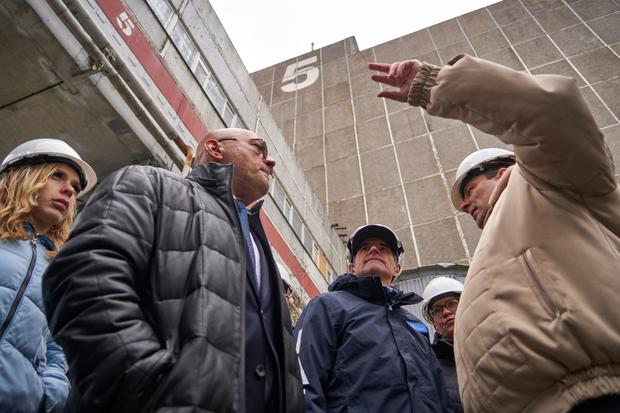U.N. pushes for Russia-Ukraine deal to protect Zaporizhzhia nuclear plant, warns of "more dangerous phase"
United Nations — The head of the United Nations' global nuclear watchdog, the International Atomic Energy Agency, walked across the front line in Ukraine this week to inspect the damage to Europe's largest nuclear power plant. Rafael Grossi made his second trip Wednesday to the Russian-occupied Zaporizhzhia Nuclear Power Plant (ZNPP) in southern Ukraine, where escalating combat poses a threat to the facility.
"In view of the persistent risks facing the ZNPP during the armed conflict in Ukraine, Director General Grossi said he remained determined to press ahead with his diplomatic efforts to protect the six-reactor plant and help prevent a nuclear accident that could have severe consequences on people and the environment in Ukraine and elsewhere," the agency said Thursday, following Grossi's visit.
- What's at stake with Ukraine's Russian-occupied nuclear plant?
"It is obvious that this area is facing perhaps a more dangerous phase. We have to step up our efforts to get to some agreement of the protection of the plant," Grossi told reporters.
Director General @rafaelmgrossi crossed the frontline to visit the #Zaporizhzhya nuclear power plant today to assess its nuclear safety & security. He reiterated the urgent need to protect the plant. pic.twitter.com/aw5Uh5yfn9
— IAEA - International Atomic Energy Agency ⚛️ (@iaeaorg) March 29, 2023
The IAEA has a rotating team permanently based at the Zaporizhzhia plant, and Grossi told The Associated Press that he felt it was his duty to push for progress in talks between Kyiv and Moscow aimed at establishing safeguards around the facility to avoid a potentially catastrophic accident. He said he would "most probably" head to Moscow in the coming days to continue those discussions.
The agency tried for months to secure an agreement that would see a demilitarized zone established around the sprawling plant compound, which has been hit by rockets several times and had its connection to Ukraine's power grid cut repeatedly, forcing it to rely on emergency diesel generators to keep vital cooling systems running.
Grossing said this week that he believed an agreement on some measures to protect the plant was "close," but he didn't give any details. On Thursday he said his objective was to "prepare and propose realistic measures that will be approved by all parties."
"We must avoid catastrophe. I am an optimist and I believe that this is possible," he said after arriving at the facility in a Russian armored vehicle, surrounded by soldiers.
He did not speak of the previous bid to secure a safe-zone around the plant, appearing to have changed his tactics to focus on specific measures.
He called his visit "extremely useful" and told French news agency AFP that one of the main commitments he was seeking from both sides was "not to attack the plant."
Grossi said Wednesday's visit had allowed him to see for himself the damage the plant had sustained since the last time he was there in February 2022, especially during intense shelling late last year.

"We remain greatly concerned about the situation around the Zaporizhzhia plant and call on Russia to end its shelling there and throughout Ukraine," a U.S. official familiar with the talks told CBS News on Thursday, repeating Washington's call for Russia "to immediately end its war on Ukraine and withdraw its troops from the country."
Oleg Nikolenko, a spokesman for Ukraine's Foreign Ministry, told CBS News on Thursday that the situation "at and around the Zaporizhzhia Nuclear Power Plant remains tense and volatile."
He renewed Ukraine's long-time argument that Russian forces were using the sensitive facility "as a military base and a storage facility for ammunition while firing shelling near the plant."
Russia and Ukraine have accused each other of shelling of and around the plant for months.
Nikolenko accused Russia of making "constant attempts to obstruct technological processes, which can cause a severe malfunction" at the nuclear plant, part of what he called "reckless and dangerous actions" that "have brought the world to the brink of a new nuclear disaster."
"Russia must immediately withdraw from the Zaporizhzhia Nuclear Power Plant and return it under Ukrainian control," he said. "This is the only way to restore nuclear safety and security."
- In:
- Nuclear Power Plant
- Ukraine
- Russia
- Vladimir Putin

Pamela Falk is the CBS News correspondent covering the United Nations, and an international lawyer.
TwitterDisclaimer: The copyright of this article belongs to the original author. Reposting this article is solely for the purpose of information dissemination and does not constitute any investment advice. If there is any infringement, please contact us immediately. We will make corrections or deletions as necessary. Thank you.







